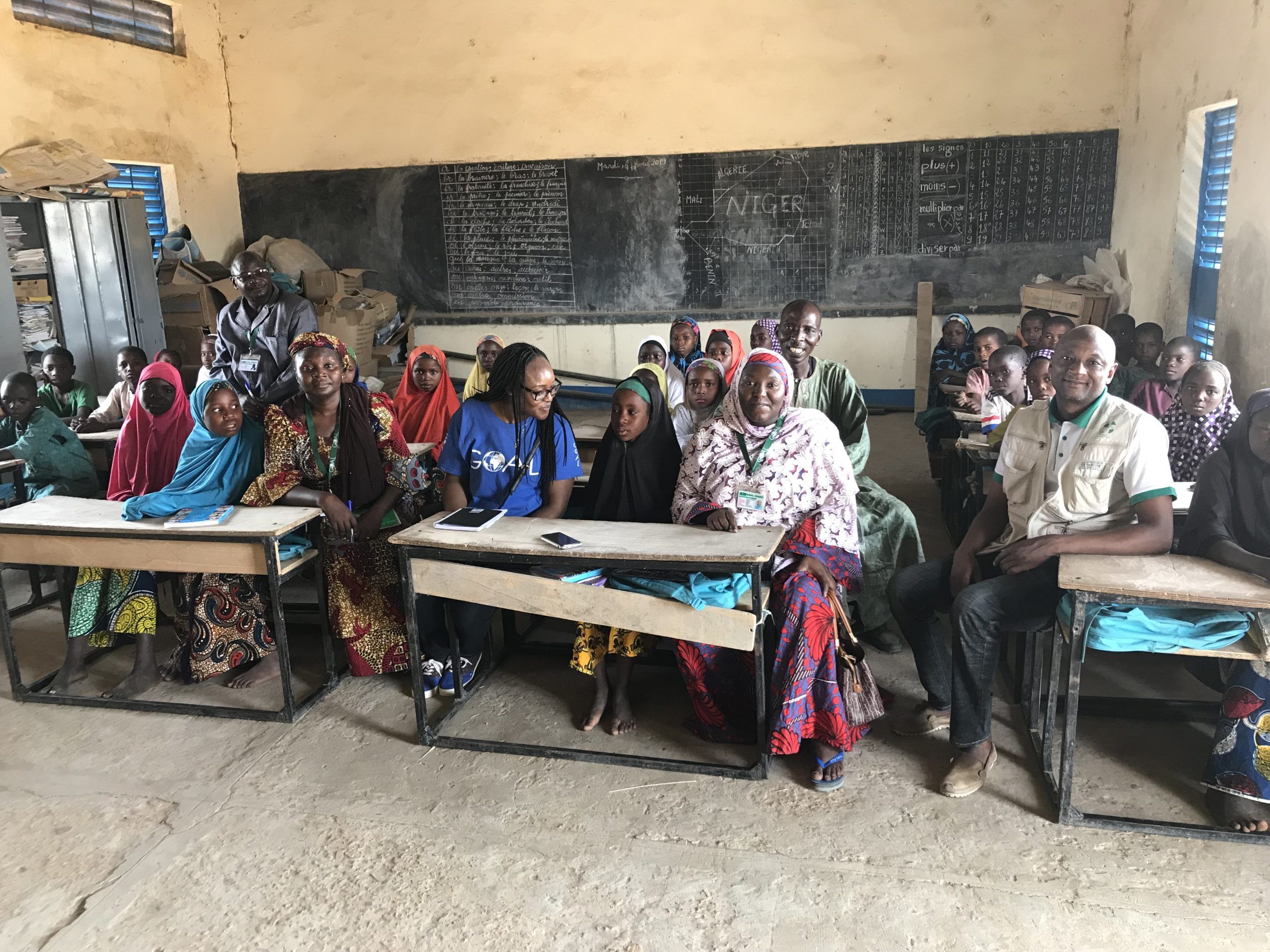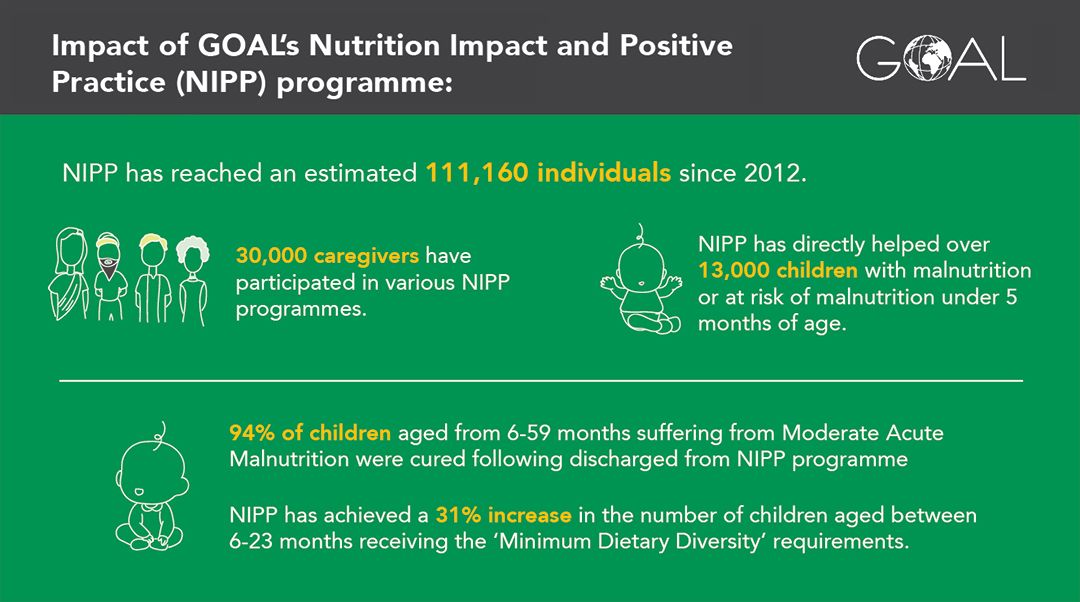 Stories
Stories
November 6, 2020 • 4 min read
Programme monitoring and evaluations has revealed the impact of GOAL’s innovative Nutrition in Positive Practice (NIPP) programme, designed to tackle malnutrition in children at source, by addressing the underlying behavioural causes of malnutrition.
New data has revealed that GOAL’s NIPP programme has a remarkable cure rate of 94% for moderate acute malnutrition when it is used to help tackle what continues to be the single greatest threat to child survival, malnutrition in children under 5.
To date, over 111,000 individuals have been reached by the programme which empowers communities to take care of their own wellbeing through the prevention or the treatment of malnutrition.
The NIPP approach works by introducing changes in behaviours and practices, thereby reducing the need to invest in expensive curative care. Sessions are comprised of highly collaborative and participatory activities including cooking demonstrations using locally available and accessible food, micro-gardening sessions.
Reaching out to school children
In Niger, it is estimated that more than one in two children between 7 and 12 years of age drop out of school. Earlier this year, a report by the UN revealed how children dropping out of the education system perpetuates the poverty cycle. The report also revealed a third of teenage girls from the world’s poorest households have never been to school.
Growing up in Niger brings many challenges, with thousands of families struggling to put food on the table. Nearly 20 percent of the population in Niger cannot meet their basic food needs. As well as poverty, conflict also torments much of the country.

A group of students from Rigal Mantche Primary School, Mirriah, Niger.
For many parents, the prospect of a free nutritious meal is a strong incentive to send their children to school. In response, GOAL recently introduced its NIPP approach in primary schools across Niger with support from Irish Aid. The programme targeted four primary schools, reaching over 500 students. The aim of the project is to help vulnerable children become “nutritionally literate” and to adopt good dietary and lifestyle behaviours.
Driving sustainable solutions
At the start of this 18-month programme, only one out of the four schools had hand-washing facilities. And none of the schools had suitable spaces to grow a wide range of nutritious vegetables, roots and herbs. But following completion of the programme, all four schools had functional hand-washing points and yielding gardens. The programme is mobilising the local community and driving sustainable, community led solutions. As a result, existing ‘NIPP Circles’ (community gatherings) already established in the local area helped provide water for the schools’ micro-gardens.
Delivering results at school
During yield seasons, micro-gardens in several schools started providing up to 5kg of kale, 2kg of salad and 2kg of tomatoes per week. This nutritious food has transformed school meals and has led to a big reduction in absenteeism. Good nutrition, particularly in early childhood, is seen as a building block for improved educational development. Bi-weekly cooking demonstrations are also educating students about the importance of nutrition and encouraging them to practice what they learn at home. Students are also being taught about the importance of good hygiene and micro-gardening. Lessons they can take home to their families.
The NIPP approach is clearly having a transformative impact within the selected schools. The project’s success has not gone unnoticed – another school in the Mirriah district has recently deciding to pilot the same approach.

Background to NIPP approach
Designed by GOAL in 2012, NIPP has been pioneered with great success across Sudan, Niger, Malawi and Zimbabwe, with Uganda becoming the latest country to implement the programme in 2019. NIPP has established a nutrition approach that is an alternative to other food-based aid approaches. Often, nutrition programmes can include blanket feeding approaches that have either been ineffective in reducing rates of malnutrition or have only had short lived effects. The programme is agile and offers a community-centred approach designed to tackle the underlying behavioural causes of malnutrition. It also has a focus on there being easy and viable solutions accessible to all participating communities and families.
NIPP Circles and community-related activities
When it comes to malnutrition, prevention is preferable to curative interventions. But the reality of the situation denotes that both often need to be implemented in parallel. Indeed, global rates of malnutrition make a compelling case for the implementation of interventions that, as well as improving the nutritional status of those already malnourished, focus more on the preventative aspect i.e. the occurrence of malnutrition in the first instance. The questionable performance of the traditional food aid approach, and the desire to tackle malnutrition at source, are just some of the reasons why GOAL’s nutrition experts have spent the past five years designing and field-testing a new approach to the prevention of malnutrition.
GOAL’s NIPP approach offers a viable and sustainable solution for malnutrition management and it’s prevention, through tackling the underlying causes of malnutrition, in locations where food-based aid is unsuitable and/or untenable.
